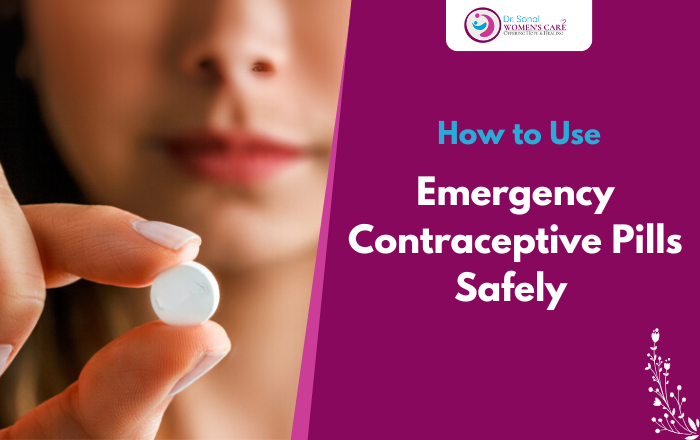Sometimes life doesn’t go as planned, protection can fail; you may forget to take your regular birth control, or you may have unprotected Intercourse. In these situations, emergency contraceptive pills, often called the morning-after pill, can help prevent pregnancy.
But here’s the thing: many people are unsure about how to use emergency contraceptive pills safely. Misusing them or relying on them too often can lead to confusion and unnecessary worry. In this article, we’ll explain these pills, how they work, when to take them, and what to expect after using them.
What Are Emergency Contraceptive Pills?
Emergency contraceptive pills (ECPs) are medications that help prevent pregnancy after unprotected Intercourse. They’re often called “morning-after pills,” but you don’t have to wait until morning to take them. In fact, the sooner you take them, the better they work.
There are two main types available:
- Levonorgestrel pills (like Plan B One-Step) – available without prescription
- Ulipristal acetate (ella) – requires a prescription
These pills work by delaying ovulation, which means they prevent your ovaries from releasing an egg. If there’s no egg, sperm can’t fertilize it, and pregnancy won’t occur.
When Should You Use Emergency Contraception?
You might consider emergency contraceptive pills in situations like these:
- Protection failed
- You forgot to take your regular birth control pills
- You had unprotected intercourse
- Your diaphragm or cervical cap moved out of place
Remember, emergency contraception is for emergencies only – it’s not meant to be your regular birth control method.
How to Use Emergency Contraceptive Pills Safely
Timing is everything when it comes to emergency contraception. Here’s what you need to know:
The Critical Time Window
- Most emergency contraceptive pills work best within 72 hours (3 days) after unprotected Intercourse.
- Some types (like ella) can work up to 120 hours (5 days)
- The sooner you take them, the more effective they are
Step-by-Step Instructions
- Read the package instructions carefully
- Take the pill as directed – usually just one pill
- You can take it with or without food
- If you vomit within 2 hours of taking the pill, contact a healthcare provider – you may need another dose
How Effective Are Emergency Contraceptive Pills?
Emergency contraceptive pills are most effective when taken quickly:
- Within 24 hours: about 95% effective
- Within 48 hours: about 85% effective
- Within 72 hours: about 75% effective
Several factors can affect how well they work:
- Your weight (they may be less effective for women over 165 pounds)
- When you ovulate in your cycle
- Other medications you’re taking
What Side Effects Should You Expect?
Most women experience only mild side effects, if any. Common ones include:
- Nausea (affects about 1 in 4 women)
- Headache
- Tiredness
- Breast tenderness
- Dizziness
These side effects usually go away within 24-48 hours.
Your Next Period
After taking emergency contraceptive pills, your next period might:
- Come earlier or later than expected
- Be lighter or heavier than usual
- Last a different number of days
If your period is more than a week late, take a pregnancy test.
Important Safety Information
Who Should Avoid Emergency Contraceptive Pills?
- Women are allergic to the ingredients
- Those taking certain medications that might interfere
- Women with specific health conditions (consult a doctor first)
Common Myths Debunked
Myth: Emergency contraceptive pills cause abortion
Truth: They prevent pregnancy; they don’t end an existing pregnancy
Myth: Using them frequently will harm your fertility
Truth: They won’t affect your ability to get pregnant in the future
After Taking an Emergency Contraception
What Happens Next?
- Continue your regular birth control method
- Take a pregnancy test if your period is late
- Consider getting tested for sexually transmitted infections if you had unprotected Intercourse.
Planning for the Future
Emergency contraceptive pills don’t protect against future pregnancies or STIs. Talk to a healthcare provider about:
- Regular birth control options that fit your lifestyle
- Protection against sexually transmitted infections
- Any concerns about your reproductive health
Frequently Asked Questions
Q: Can I take emergency contraceptive pills if I’m on birth control?
A: Yes, you can take them even if you’re using regular birth control, especially if you missed pills or had contraceptive failure.
Q: How many times can I use emergency contraception?
A: While they’re safe to use more than once, they’re not as effective as regular birth control and may cause irregular periods.
Q: Will emergency contraceptive pills protect me from STIs?
A: No, they only help prevent pregnancy. Consider STI testing if you’ve had unprotected Intercourse.
When to See a Doctor
Contact a doctor if you experience:
- Severe stomach pain
- Heavy bleeding that soaks more than two pads per hour
- Signs of pregnancy after taking the pills
- Severe or persistent side effects
Need Medical Advice? We’re Here to Help
Emergency contraceptive pills are generally safe, but every woman’s health needs are unique. If you have questions about emergency contraception, notice unusual symptoms, or want to explore birth control options, speaking with a trusted gynecologist can make all the difference.
At Dr. Sonal Women’s Care, Dr. Sonal Katarmal, widely regarded as one of the Best gynecologists in Ambegaon Budruk, Pune, provides compassionate, expert care for all aspects of women’s health.
Take the first step toward clarity and confidence in your reproductive health. Book your consultation with Dr. Sonal Women’s Care today.

